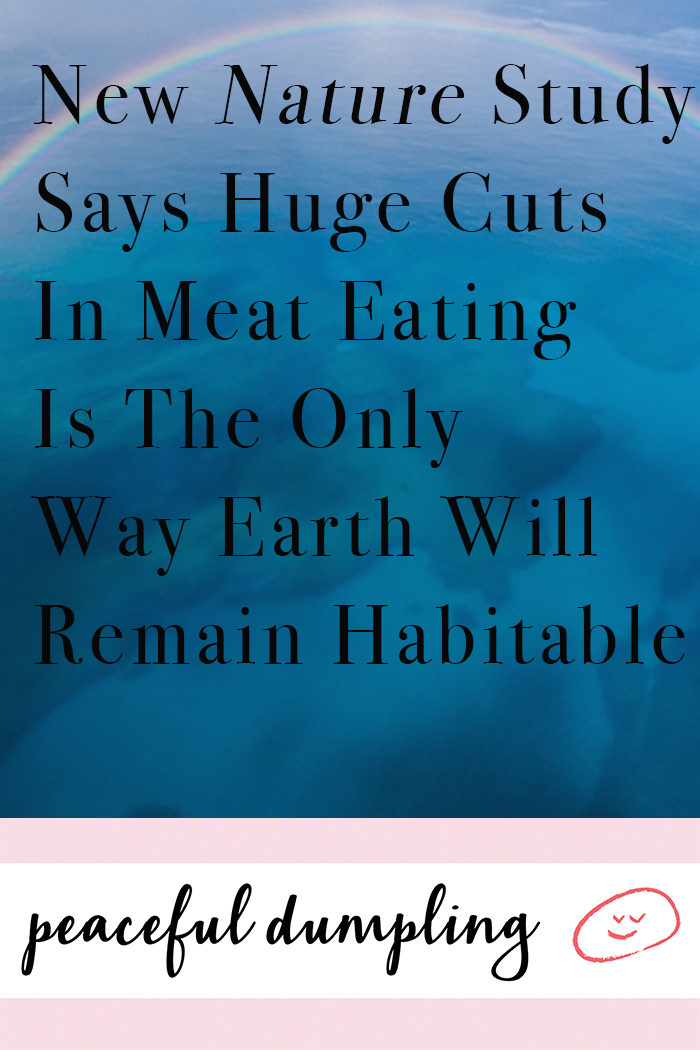 A new landmark study in Nature concludes that the Earth will effectively become food-bankrupt by 2050 unless meat consumption is drastically reduced. It affirms and complements the findings by an earlier meta-study published in Science, which found that adopting a vegan diet is the most effective thing you can do to slow climate change.
A new landmark study in Nature concludes that the Earth will effectively become food-bankrupt by 2050 unless meat consumption is drastically reduced. It affirms and complements the findings by an earlier meta-study published in Science, which found that adopting a vegan diet is the most effective thing you can do to slow climate change.
Unlike the other study, the Nature study was designed to examine how to feed the Earth’s growing population under the impact of global warming and climate change, rather than looking at diet as a way to reduce global warming. Nevertheless, this research also calls for a massive reduction in meat and dairy to ensure that humanity can feed itself in an increasingly resource-deprived world. With each incremental increase in global mean temperature, every food crop is expected to drop in yield. This week, the Intergovernmental Panel on Climate Change warned that we are currently “nowhere near on track” to keep the rise in temps below 1.5*C, and that we have only until 2030 to prevent catastrophic climate change.
The study states that by 2050, global population will balloon to 10 billion people while crop yields will have fallen precipitously due to climate change and unsustainable food production techniques. If we don’t change our food system and behavior, the Earth will case to be a “safe operating space for humanity” in a few decades, says Marco Springmann, the first author of the study.
The authors are urging that the Earth’s populations eat meat less than once a week. Other strategies such as a dramatic food waste reduction, water conservation and management, reduced fertilizer pollution, and education campaigns must be employed at the same time to ensure that the planet remains habitable.
In Western countries, beef, pork, and lamb consumption has to fall by about 90%, to be replaced by 400% increase in legumes and pulses. Strikingly, their analysis shows that eggs produce 7 times as much greenhouse gases as legumes per kilogram, and 13 times as much as soybeans—debunking the pervasive misunderstanding that eggs are a sustainable animal protein unlike red meat. That’s to say nothing of beef, clocking in at 141 times as much GHG as legumes and 270 times as much as soybeans. (The full breakdown of resources per food item, including the metrics of cropland use, bluewater use, and fertilizer impact can be seen on Nature).
“Greening the food sector or eating up our planet: this is what is on the menu today,” says Professor Johan Rockström of the Potsdam Institute for Climate Impact Research, one of the authors of the study.
With this new study, both of the world’s most prestigious scientific journals have categorically found that vegan or nearly vegan diets adopted on a near universal scale are mandatory to keep the planet habitable. Yet people are still resistant to making changes themselves. Prof Peter Smith at the University of Aberdeen, who was not part of the research, commented: “We know food choices are very personal, and that behavior change can be difficult to encourage, but the evidence is now unequivocal – we need to change our diets if we are to have a sustainable future. The fact that it will also make us healthier makes it a no-brainer.”
What’s up for debate isn’t the scientific truth of these findings, but how to get around people’s avoidance of the truth. The fact that cutting meat consumption is the superior climate change strategy (compared to eating local/seasonal, eating organic, driving less, saving energy at home, and installing solar panels) is only clear to 6% of the US population and 12% of the Dutch population, according to a 2016 study. The silver lining is that “willingness to adopt the less meat option increased with its perceived effectiveness”—that is, the more people finally understood how crucially effective it is to cut meat, they were more willing to modify their personal behavior. However, this also works primarily with people who self-identify as environmentalists, have a “postmodern world view…and are suspicious of the corporate influences in our economic system.”
To convince those with traditional and modern world views who don’t have environmentalist values, we need to seek out another way to communicate. Appealing to their self-interest might be one way. It is not even our grandchildren who will be dealing with apocalyptic famine, but our children and in fact, ourselves. The Nature study might just provide a new incentive for the traditionists/modernists of the population, with its stark warning that either we change now, or make our children the Last Generation.
Related: New Science Study Says Going Vegan Reduces Carbon Footprint By 73%
How to Set Your Own Climate Change Standards, When The Law Doesn’t
Climate Change Depression Is Real. How To Overcome Environment Melancholia
Get more like this—Subscribe to our daily inspirational newsletter for exclusive content!
__
Photo: Jakob Owens on Unsplash

